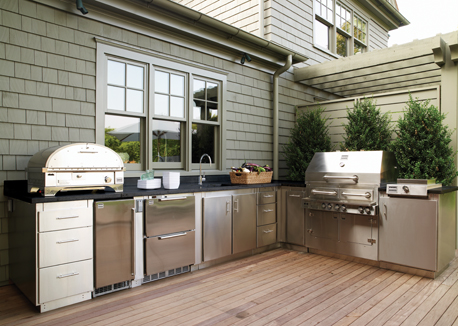It goes without saying that outdoor kitchens are different from their indoor cousins. And with the cold and snow of winter fast approaching many areas of the country, there are a number of points designers should know about keeping
grills
and outdoor kitchens healthy during the cold season. “Grills and other outdoor kitchen equipment definitely should receive special attention before the snow flies,” said Russ Faulk, VP of marketing and product development for Kalamazoo Outdoor Gourmet.
“We keep grilling outside” in the winter, said Dan Marguerite, owner of Backyard Barbeque Store in Wilmette, Ill., a Chicago suburb. Marguerite agrees with Faulk, saying outdoor cooks should give their grills a thorough cleaning inside and out to remove any debris or ash that might have accumulated over the summer. Faulk recommends protecting the exterior of stainless-steel grills with stainless-steel polish.
Those who are closing up their grills for the winter should “give it a thorough cleaning and shut off the gas supply,” said Marguerite. He adds that grills using liquid propane as fuel should disconnect the canister from the grill and store it in a garage or storage shed. Mark Hopwood, sales manager at Builders Appliance Center in Englewood, CO, a suburb of Denver, said covering an unused grill in the winter is a good idea. “You want to keep water and snow out of the controls,” he said. “If water gets in and freezes and expands, things could crack or break.”
“Countertops should be sealed twice a year,” said Marguerite. Recently sealing his bluestone counters in anticipation of winter, he said he prefers Prosoco SLX 100 because of its ability to resist stains caused by nature (birds) and friends (wine spills, chocolate cake smears).
Marguerite said refrigerators should be turned off, although manufacturers offer different suggestions for winter care. He said he has one universal recommendation: Clean them out before they are turned off. He also advises placing a box of baking powder inside each unit to absorb any odors that might arise during the “off season.”
Faulk said all water lines should be shut off and drained, including keg tappers. “Anything that had a liquid flowing through it needs to be thoroughly dried out to prevent freezing and cracking within the lines,” he said. If the homeowner has access to compressed air, Faulk recommends using it to “blow out the lines” by forcing air through them, ensuring they are completely dry.
Hopwood agrees with Faulk’s recommendation to drain water lines, but offers a low-tech approach for the faucets for people who don’t have the skills to remove a faucet. “Put a cover over the faucet,” he said. Hopwood added that it should be sized to fit the homeowner’s particular faucet and be made of a weatherproof, durable material.
“Put a cover over the sink drain to prevent winter debris from falling into it,” said Faulk. He said homeowners should also remove their faucets because it will ensure that delicate interior parts won’t freeze, break or corrode. “Kohler offers a line of quick-connect faucets that makes it easy to install and remove,” said Polly Ho, regional sales manager at Kalamazoo Outdoor Gourmet.
While homeowners may not be able to us the refrigeration or sinks in their outdoor kitchens during the winter, “more consumers are using their grills all four seasons, no matter where they are,” said Hopwood. “Use the grill when you want to. There’s nothing better than a steak off the grill in the winter.”
—Chris Mordi is VP of communications for Kalamazoo Outdoor Gourmet. Photo courtesy of Kalamazoo Outdoor Gourmet.









